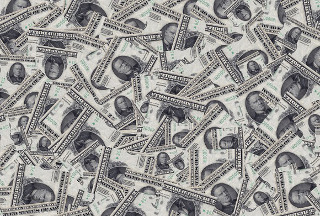Got Choices?

Sizing the Money Supply
One of the primary arguments for the Federal Reserve is, we need an elastic, or re-sizable, money supply. Presumably, someone needs to have his hand on a lever that either makes more dollars or destroys some, depending on what is needed at the time. An obvious question is: who gets to make that decision, and on what basis?
Are we just supposed to accept that an emergency stimulus bill injecting billions of new dollars into the economy is good for everyone? Or is it possible such a thing might be good only for some people and maybe bad for others? Maybe a spending stimulus is good for banks and bad for regular working people. Maybe it is good for Wall Street investors and bad for taxpayers.
The Federal Reserve system is essentially a coalition of all the banking powers in the country. When they make a decision to adjust interest rates or to stimulate more borrowing, whose interests do you think they are most likely to represent? Yours?
Who should have the power to decide when our money supply will become bigger or smaller? Since we now understand that money is debt, we can gain some insight by rephrasing the question: Who should have the power to decide if and when we will go further into debt?
Like many questions, it depends on what you are trying to accomplish. Are we just trying to keep GDP high so politicians can claim they are doing a good job? Are we trying to keep the price of stock market securities high so Wall Street brokers and fund managers can continue to skim profits off the top of the economy? Or is there something else we should focus on instead?
What if our monetary policies were instead designed to improve the prosperity, meaning the personal balance sheets, of regular Americans like you? Wouldn’t that be better than simply trying to maximize the amount of money that gets spent each year?
Our current monetary policy holds each of us in a degree of bondage. The federal government has incurred a certain amount of debt on our behalf but without our consent. Yet it is still our obligation to make payments on that debt.
We do this, in part, by paying our individual income tax. But much more significantly, we do it by paying more for every product and service we buy so corporations can pay their corporate income taxes.
Every year you are in the workforce, a certain percentage of your time is consumed just to service federal expenditures. For most people, this consumes the weeks between Jan 1 and sometime in April or May. For others, it is longer. Only after that obligation has been serviced, can we begin to earn money for ourselves and the needs of our families.
How much of your year is eaten up in taxes? Even if you are part of the nearly half of the population who don’t pay personal income taxes, you probably still lose a significant portion of your total productivity to the corporate income tax. At every level of production, companies who have to pay this tax mark up their prices in order to pay it. They also have to raise wages for their employees so they will have something left in take-home pay after all withholdings have been applied.
All these increases end up being funded by you, the consumer. You may not think you are paying income taxes but you are. If not for these taxes, everything you buy would be that much less expensive. The extra money you would have left over could be used to improve your quality of life.
If you are part of the group who do pay personal income taxes, then you will also pay an additional 20% to 35% of your total productivity. And the really sad thing is, in spite of all these taxes being paid, they only represent a fraction of all the money being spent. Each year the federal government goes further and further in debt, effectively passing the burden onto our children and grandchildren.
As of 2019, the total amount of US federal debt attributable to each man, woman and child in the country is close to $70,000, and it is rising rapidly. That is like having two extra car loans you have to deal with every month in addition to all the other things you have to pay for.
But what is worse, you will never get it paid off. In fact, it will grow each year and you will never get out of the hole because someone else is incurring new debt on your behalf faster than you can pay it down. You just have to keep working in an endless cycle, making your payments on an obligation you can never satisfy.
You are indentured in the service of the central bank and those who benefit from the largesse of the federal government.
Let’s consider this critical function of the Federal Reserve to manage the size of the money supply. What is the correct number of dollars to have in existence at any given time? Let us re-ask the question as we did before: How much debt should there be at any given moment?
If you value choice, the answer is simple: The correct amount of debt is exactly that amount people choose to enter into of their own free, competent and informed will. It should not be a penny higher or lower. Non-consensual debt is involuntary servitude. And that is the natural consequence of an artificially managed money supply.
What about the argument that the economy will suffer if we allow people to choose their own levels of debt? Some will benefit from government stimulus and traditional measures of “the economy” like an ever-increasing GDP. But these tend to be parasites on the rest of the economy.
Products and services which are valuable and naturally in demand, don’t require government stimulus spending in order to thrive. It is only those providers with whom we would otherwise not choose to trade that need the extra push. They are the ones who may need the help of government to survive.
If you are an individual consumer, what difference does the GDP make in your life? You should be more concerned with your individual and family balance sheet and not the total amount of money being spent on some government boondoggle.
A strong GDP does not cause economic prosperity for individuals. Rather it is an indication of the underlying productivity in the economy. It is an effect–not a cause.
Said another way, it does not matter how much you are earning with your right hand, if you are losing even more with your left hand. The true benefit would be to increase your assets and decrease your liabilities. That way, you will have more things to enjoy and more value to trade for the things you really want and need.
If we had a healthy supply of choice-oriented alternative currencies at work in the economy, we could trust the economic laws of supply and demand to regulate the size of our money supply. We would not need an artificial regulation mechanism.
We can trust that when money begins to become too scarce, it will become more valuable at the same time. A natural incentive is developed to create more of it. In other words, if extra liquidity is needed, people will be incentivized to borrow in order to produce it.
Likewise, when money becomes too plentiful, there will be a natural tendency to pay down debt and shrink the supply. We do not need an antiquated and monopolistic cartel of bankers to tell us how indebted we need to be in order to optimize some false metric that means nothing to our individual wealth and prosperity.
